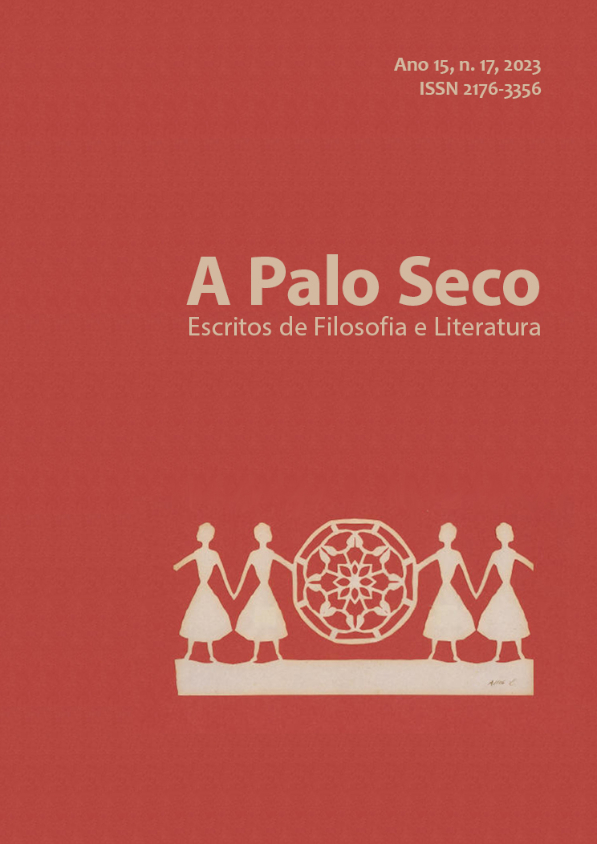Riobaldo, homo viator
Keywords:
João Guimarães Rosa. The devil to pay in the backlands. Homo viator. Platonic tradition.Abstract
The myth of Odysseus’ return to Ithaca, in addition to being the central theme of the Homeric epic, had already served as inspiration for the Platonic tradition as an allegory of the soul’s return to its origin. Taking advantage of the narrative of the hero’s adventures and misadventures in the enterprise, the Platonic school used the image of return to identify the soul’s journey towards the beautiful, the good and the true, or with God. Riobaldo, still not clear about his purpose in the jagunçagem, hears Diadorim’s call, since the meeting with the Boy (“You need to have courage...”, ROSA, 1994, p. 145), and joins Joca’s gang Ramiro. Riobaldo, on his itinerary through the backlands and in the exercise of courage as a purgative virtue, keeps his word and avenges the betrayal of the leader’s murder. Riobaldo: his wandering through the backlands allows us to deduce precursors such as Dante, Aeneas and Odysseus. Riobaldo, a homo viator against the grain.
References
AGOSTINHO. Santo. Confissões. J. Oliveira e A. Ambrósio de Pina. RJ: Vozes, 2011.
ALIGHIERI, Dante. A Divina Comédia. Trad. Italo Eugenio Mauro. SP: Ed. 34, 2017.
AQUINO, São Tomás de. Os sete pecados capitais. Trad. Luiz Jean Lauand. SP: Martins Fontes, 2000.
ARAUJO, Heloísa Vilhena. O roteiro de Deus: Dois estudos sobre Guimarães Rosa. SP: Manarim, 1996.
ARISTÓTELES. The basic works of Aristotle. Richard McKoen (ed). NY: The Modern Library, 2001.
CANDIDO, Antonio. Tese e Antítese. SP: T. A. Queiroz, 2002.
CHEVALIER, Jean e GHEERBRANT, Alain. Dicionário de Símbolos. Trad. Vera da Costa e Silva et alli. RJ: José Olympio, 2019.
CURTIUS, Ernst Robert. Literatura europeia e Idade Média latina. Trad. Teodoro Cabral. Brasília: Instituto Nacional do Livro, 1979.
DODDS, E. R. Os gregos e o irracional. Trad. Paulo Domenech Oneto. SP: Escuta, 2002.
ELIOT, T. S. “Ulysses, order and mith”. In.: Frank Kermod (Org.), Selected Prose. San Diego (USA): Harcourt, 1975, pp. 175-178.
GALINDO, Caetano. Sim, eu digo sim. SP: cia das Letras, 2016.
GOMES, Paulo de Tarso. Gabriel Marcel: A filosofia da existência como neo-socratismo. In.: Reflexão, n.32, Campinas, 2007, pp. 11-17.
HIGHET, Gilbert. The Classical tradition: Greek and roman influences on western literature. NY: Oxford Press, 2015.
HOMERO. Odisseia. Trad. Frederico Lourenço. SP: Cia das Letras, 2011.
HONORATO, Sérvio. Comentários. Trad. Priscila de Oliveira Campanholo. In.: (dissertação de mestrado) Os Comentários de Sérvio Honorato ao “Canto VI” da Eneida. SP: USP, 2008.
JOYCE, James. Ulisses. Trad. Antônio Houaiss. SP : Abril Cultural, 1980.
JURASZ, Izabela. Comment retourner à Ithaque ?: Le voyage d’Ulysse selon les platoniciens, gnostiques et chrétiens. In. : Revue d’études augustiniennes et patristiques, n. 68, 2022, pp. 1-23.
KONSTAN, David. The Emotions of the Ancient Greeks. Toronto: University of Toronto Press, 2006.
KONSTAN, David. “A short history of envy”. In. Antigone Journal. Posted on april, 30th, 2022 (https://antigonejournal.com/2022/04/short-history-of-envy/). Acessado em 17 de Agosto de 2023.
MARCEL, Gabriel. Homo Viator: Prolégomènes à une métaphysique de l’espérance. Paris: Aubier, 1944.
PINHEIRO, Marcus Reis. “Evágrio Pôntico”. In. A mística e os místicos. Org. Eduardo Guerreiro Losso, Maria Clara Bingemer, Marcus Reis Pinheiro. RJ: 2022, pp. 256-265.
PINHEIRO, Marcus Reis. Introdução. In.: PÔNTICO, Evágrio. Sobre as oposições de virtudes e vícios. Trad. Marcus Reis Pinheiro. In. Revista Clássica, v. 1, n. 35, 2022, pp. 1-20.
PLOTINO. Enéadas. Trad. José Seabra e Juvino Alves Maia Jr. BH: Nova Acrópole, 2014.
PÔNTICO, Evágrio. Sobre as oposições de virtudes e vícios. Trad. Marcus Reis Pinheiro. In. Revista Clássica, v. 1, n. 35, 2022, pp. 1-20.
ROSA, João Guimarães. Grande Sertão: Veredas. RJ: Nova Aguilar, 1994.
STRÓŻYŃSKI, Mateusz. “Time, Self and Aporia: Spiritual exercise in Augustine”. In.: Augustinian Studies, v. 40, n. 1, 2009, pp. 103 120.
VIRGÍLIO. Eneida. Trad. Manuel Odorico Mendes. SP: Montecristo, 2017.
Published
How to Cite
Issue
Section
License
Copyright (c) 2024 A Palo Seco – Escritos de Filosofia e Literatura

This work is licensed under a Creative Commons Attribution-ShareAlike 4.0 International License.
O/A autor/a deverá concordar com os termos da Declaração de Direitos Autorais, no qual cede à revista A Palo Seco – Escritos de Filosofia e Literatura como detentora dos direitos autorais da publicação.
1. As opiniões expressas nos textos submetidos à revista A Palo Seco – Escritos de Filosofia e Literatura são de responsabilidade do/a autor/a.
2. Autores/as conservam os direitos de autor/a e concedem à revista o direito de primeira publicação, com o trabalho simultaneamente licenciado sob a Licença Creative Commons Attribution que permite a partilha do trabalho com reconhecimento da autoria e publicação inicial nesta revista.
3. O/A autor/a comprometem-se a seguir as “Normas para submissão de manuscritos”, na plataforma SEER.
4. Compete aos/às autores/as aceitar as sugestões de alterações na submissão, quando encaminhadas por sugestão dos/as avaliadores/as, Revisores/as Científicos e/ou da Comissão Executiva. Sempre que houver alterações de que os/as autores/as discordem, devem ser apresentadas as respectivas justificações, se for o caso.
5. A reprodução de material sujeito a direitos de autor/a foi antecipadamente autorizada.
6. Os textos são originais, não publicados nem submetidos a outras revistas.
Licença Creative Commons CC BY-SA (Atribuição - Compartilha Igual) 4.0 Internacional.








